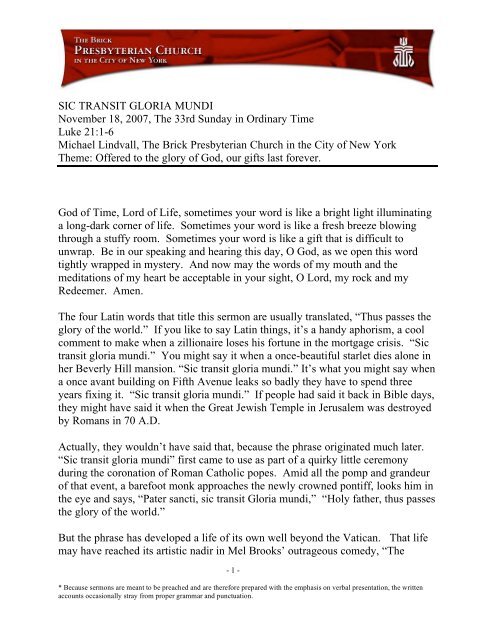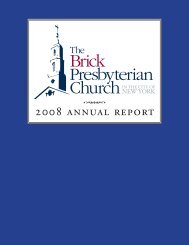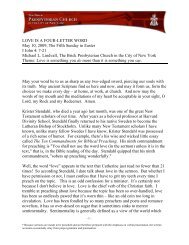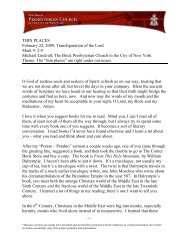SIC TRANSIT GLORIA MUNDI November 18, 2007 ... - Brick Church
SIC TRANSIT GLORIA MUNDI November 18, 2007 ... - Brick Church
SIC TRANSIT GLORIA MUNDI November 18, 2007 ... - Brick Church
You also want an ePaper? Increase the reach of your titles
YUMPU automatically turns print PDFs into web optimized ePapers that Google loves.
<strong>SIC</strong> <strong>TRANSIT</strong> <strong>GLORIA</strong> <strong>MUNDI</strong><br />
<strong>November</strong> <strong>18</strong>, <strong>2007</strong>, The 33rd Sunday in Ordinary Time<br />
Luke 21:1-6<br />
Michael Lindvall, The <strong>Brick</strong> Presbyterian <strong>Church</strong> in the City of New York<br />
Theme: Offered to the glory of God, our gifts last forever.<br />
God of Time, Lord of Life, sometimes your word is like a bright light illuminating<br />
a long-dark corner of life. Sometimes your word is like a fresh breeze blowing<br />
through a stuffy room. Sometimes your word is like a gift that is difficult to<br />
unwrap. Be in our speaking and hearing this day, O God, as we open this word<br />
tightly wrapped in mystery. And now may the words of my mouth and the<br />
meditations of my heart be acceptable in your sight, O Lord, my rock and my<br />
Redeemer. Amen.<br />
The four Latin words that title this sermon are usually translated, “Thus passes the<br />
glory of the world.” If you like to say Latin things, it’s a handy aphorism, a cool<br />
comment to make when a zillionaire loses his fortune in the mortgage crisis. “Sic<br />
transit gloria mundi.” You might say it when a once-beautiful starlet dies alone in<br />
her Beverly Hill mansion. “Sic transit gloria mundi.” It’s what you might say when<br />
a once avant building on Fifth Avenue leaks so badly they have to spend three<br />
years fixing it. “Sic transit gloria mundi.” If people had said it back in Bible days,<br />
they might have said it when the Great Jewish Temple in Jerusalem was destroyed<br />
by Romans in 70 A.D.<br />
Actually, they wouldn’t have said that, because the phrase originated much later.<br />
“Sic transit gloria mundi” first came to use as part of a quirky little ceremony<br />
during the coronation of Roman Catholic popes. Amid all the pomp and grandeur<br />
of that event, a barefoot monk approaches the newly crowned pontiff, looks him in<br />
the eye and says, “Pater sancti, sic transit Gloria mundi,” “Holy father, thus passes<br />
the glory of the world.”<br />
But the phrase has developed a life of its own well beyond the Vatican. That life<br />
may have reached its artistic nadir in Mel Brooks’ outrageous comedy, “The<br />
- 1 -<br />
* Because sermons are meant to be preached and are therefore prepared with the emphasis on verbal presentation, the written<br />
accounts occasionally stray from proper grammar and punctuation.
History of the World, Part I.” In that film, Brooks has a Roman Senator speak a<br />
shortened version of the phrase during the Roman Empire segment of the film.<br />
“Sic transit gloria,” one Roman Senator says to the other Roman Senator, in Latin.<br />
To which the second replies, in English, “I didn’t even know Gloria was sick.”<br />
The 21st Chapter of Luke’s Gospel finds Jesus and his disciples in Jerusalem<br />
during the week between Palm Sunday and Good Friday. Each day, Jesus goes to<br />
the courtyard in front of the magnificent Temple built atop the highest hill in<br />
Jerusalem. Nefarious King Herod had begun this particular Jewish temple almost<br />
50 years earlier; it was still probably not quite completed. In the first six verses of<br />
this 21st Chapter of Luke, two things happen. First, Jesus and his followers watch<br />
people making contributions to the temple by dropping coins in one of 13<br />
containers shaped like inverted trumpets installed for that purpose. Several<br />
wealthy people make generous donations; a poor widow makes a modest, but for<br />
her, extraordinarily generous, donation. In the second part of the reading, the<br />
disciples turn their attention from these contributors to the temple itself. They<br />
comment about how very lovely the building is, “adorned with beautiful stones and<br />
gifts dedicated to God.” To which Jesus replies, “… the days will come when not<br />
one stone will be left upon another; all will be thrown down.” “Sic transit gloria<br />
mundi,” as it were.<br />
About forty years after Jesus’ death and resurrection, the Roman general Titus,<br />
soon to be Emperor, laid siege to Jerusalem. The city had been held by Jewish<br />
rebels for the last four years. In August of 70 A. D., the city fell to the Roman<br />
legions. The great temple was utterly destroyed. Only one massive retaining wall<br />
on the western foot of the temple mount remained. That wall, the Western or<br />
“Wailing Wall,” is all there is today.<br />
There are two theories as to why the temple was leveled. One says that it was a<br />
deliberate strategy. Titus wanted to humiliate the Jews and stamp out the Jewish<br />
and Christian religions associated with the temple. Remember that in the First<br />
Century, Christians were still seen as a particular kind of Jew. The other theory<br />
says that burning the temple was a mistake. Titus’ troops just got out of hand.<br />
Either way, one glaring fact is obvious: These ages later the temple is still in ruins,<br />
but Judaism and Christianity thrive.<br />
- 2 -<br />
* Because sermons are meant to be preached and are therefore prepared with the emphasis on verbal presentation, the written<br />
accounts occasionally stray from proper grammar and punctuation.
So you have to ask this question. If the temple was bound for dust, and if Judaism<br />
and Christianity would perfectly well survive the temple’s passing, what do you<br />
say to the widow who donated everything she had to that temple? What to you say<br />
to anyone, rich or poor, who dropped contributions in those upside-down temple<br />
offering trumpets? And for that matter, what do you say to you and me, all of us<br />
who in ten minutes will enact a Twenty-first Century version of that scene at the<br />
temple? We don’t have thirteen upside-down brass trumpets, just a pair of wicker<br />
baskets, but you must admit, the scene echoes Luke 21. After the sermon, we’ll be<br />
offered an opportunity remarkably parallel to that day in the temple courtyard –<br />
come forward and place some gift: your Sunday offering, your 2008 pledge, some<br />
personal commitment, maybe a prayer, something, in a container in this glorious<br />
latter-day temple.<br />
The Jerusalem temple was not forever, and this gorgeous building we’re sitting in<br />
isn’t forever, either. No building is forever; in fact, this is <strong>Brick</strong>’s third.<br />
Congregations themselves are not forever. There’s not an individual Christian<br />
congregation in the world that’s anywhere close to really ancient. None of the<br />
mission organizations we support with the money we give to the church are<br />
forever. Great programs come and go. Successful mission operations come and<br />
go. Good grief, everything comes and goes. <strong>Church</strong>es, cities, nations, empires<br />
come and go. You and I come and go. “Sic transit gloria mundi,” indeed.<br />
But not every glory passes. The glory of God does not pass. The glories of God<br />
that are love and compassion and mercy and righteousness do not pass away. And<br />
everything we offer to the glory of God because it becomes part of the glory of<br />
God does not “transit,” does not pass away. So when you walk forward in a<br />
moment and place whatever you offer, offer it to the glory of God. It is not offered<br />
to the glory of the church, it’s not for the glory of our projects, or our plans, or our<br />
good intentions, it is offered to the glory of God.<br />
So, no glory for us?<br />
No glory for the Stewardship Committee.<br />
No glory for the Session.<br />
No glory for the Mission Committee.<br />
- 3 -<br />
* Because sermons are meant to be preached and are therefore prepared with the emphasis on verbal presentation, the written<br />
accounts occasionally stray from proper grammar and punctuation.
No glory for the donors.<br />
No glory for this great old building.<br />
No glory for the ministers.<br />
All to the glory of God.<br />
You give God the glory when you remember that you can only give anything at all<br />
because God has given you the life, the means, the health, the energy to do it in the<br />
first place. For a church like <strong>Brick</strong> on this Stewardship Dedication Sunday, this<br />
means honestly admitting everything we think of as ours: the vision, the drive, the<br />
money, the organizational talent, all of it comes from God.<br />
People, especially successful people, are often tempted to imagine that they’re<br />
totally self-made. They’re lured into thinking that they did it all by themselves.<br />
But the truth is this: behind every success and underneath any accomplishment<br />
there lie gifts, gifts from God I dare say, gifts like good health, gifts like a clever<br />
mind, gifts like insight or talent or hunch, gifts like a good education and<br />
supportive family, even, face it, the gift of being born into privilege. These are<br />
gifts. We did nothing to deserve them. They are not ours by right.<br />
Nothing is more revolting than that overweening sense of entitlement you<br />
sometimes meet in the privileged corners of the world. It’s revolting because you<br />
know in your heart that it’s built on a lie of self-creation and autonomy. So we<br />
give God the glory by being radically honest about the fact that we simply did not<br />
get here ourselves; we only get anywhere by the grace of God.<br />
Give God the glory by remembering that all of this effort is not for us or for our<br />
good. It is for the glory of God. This church is not essentially for us; it’s for God.<br />
Everything we try to do as a church is not to our credit. The credit goes to God<br />
who is simply using us to do it.<br />
It’s all from God, and it all returns to God, and in this circle of gift received and<br />
gift given, God is glorified, not you, not me, not <strong>Brick</strong> <strong>Church</strong>. In other words,<br />
(hate to break it to you this bluntly) it’s not about your glory, it’s not about my<br />
glory, it’s not even about the glory of this great church.<br />
- 4 -<br />
* Because sermons are meant to be preached and are therefore prepared with the emphasis on verbal presentation, the written<br />
accounts occasionally stray from proper grammar and punctuation.
If the brokenness of this old world has some core malignancy, it must be the<br />
tendency for every last one of us to see himself or herself as the center of the<br />
universe. Each of us tends to fancy himself the one around which everyone and<br />
everything rotates like planets around the sun. Even faith can become self-serving:<br />
a way to find peace... for me, a way to find fulfillment... for me, a way to discover<br />
meaning... for me.<br />
Now, from a geometric point of view this proclivity to plant one’s self at the center<br />
of existence makes perfect sense. I mean, from my position standing here in this<br />
pulpit, there is infinity to the east, infinity to the west, infinity to the south, infinity<br />
to the north, infinity upward and infinity downward. It’s only logical: I must be<br />
the center of everything.<br />
To step off that precipitous little throne of the ego in which all is about my glory,<br />
that seat at the center, always longing for everything to be directed at me, to do this<br />
is not just a morally noble stride, it’s nothing less than a step into liberation. For<br />
the raw truth is that only when that in us which clamors to be a god with a little “g”<br />
is knocked of the throne can we become the human beings we were meant to be.<br />
It’s not about your glory; it’s about the glory of God. It’s not about my glory; it’s<br />
about the glory of God. It’s not even about the glory of this great church; it’s<br />
about the glory of God. As that old Latin aphorism reminds us, whatever glimmers<br />
of glory may slant our way in this life will indeed pass away. “Sic transit gloria<br />
mundi.”<br />
The glory of our noblest efforts will pass. “Sic transit gloria mundi.” The glory of<br />
this church will pass away. “Sic transit gloria mundi.” You and I will pass into a<br />
greater glory. “Sic transit gloria mundi.”<br />
But anything we offer to the glory of God abides forever. In a moment, when we<br />
come forward, we’ll each have the opportunity to do something that will really last,<br />
last forever. The gifts we bring, the commitments we make, the prayers promise to<br />
offer, if offered to God are taken up into the glory of God. All we give, all we do,<br />
everything we offer to the glory of God, becomes a part of a great, irresistible,<br />
eternal conspiracy of love and peace. Our gifts, or work, our commitments all<br />
- 5 -<br />
* Because sermons are meant to be preached and are therefore prepared with the emphasis on verbal presentation, the written<br />
accounts occasionally stray from proper grammar and punctuation.
ecome more than mere mortal and passing efforts. They become vectors in an<br />
unstoppable divine trajectory aimed toward the triumph of things eternal, namely<br />
the compassion, justice, peace and righteousness that are the very glory of God.<br />
The temple to which that poor widow in Jerusalem offered her two cents would be<br />
dust forty years later. But her gift was not made simply to that passing temple; her<br />
gift was offered to the glory of God. And here we are, two thousand years, later<br />
reaping the spiritual fruit of her gift. Her two cents live.<br />
“Sic transit Gloria mundi.” Yes indeed, the glory of the world passes away. But<br />
I’d like to coin a fresh Latin aphorism this morning, a counter-truth to that old<br />
truth. I checked the Latin to make sure I have it right. My new aphorism goes like<br />
this, “Sic non transit gloria dei.” “The glory of God does not pass away.”<br />
“Sic non transit gloria dei.” In the name of the Father, and of the Son, and of the<br />
Holy Spirit. Amen.<br />
- 6 -<br />
* Because sermons are meant to be preached and are therefore prepared with the emphasis on verbal presentation, the written<br />
accounts occasionally stray from proper grammar and punctuation.






